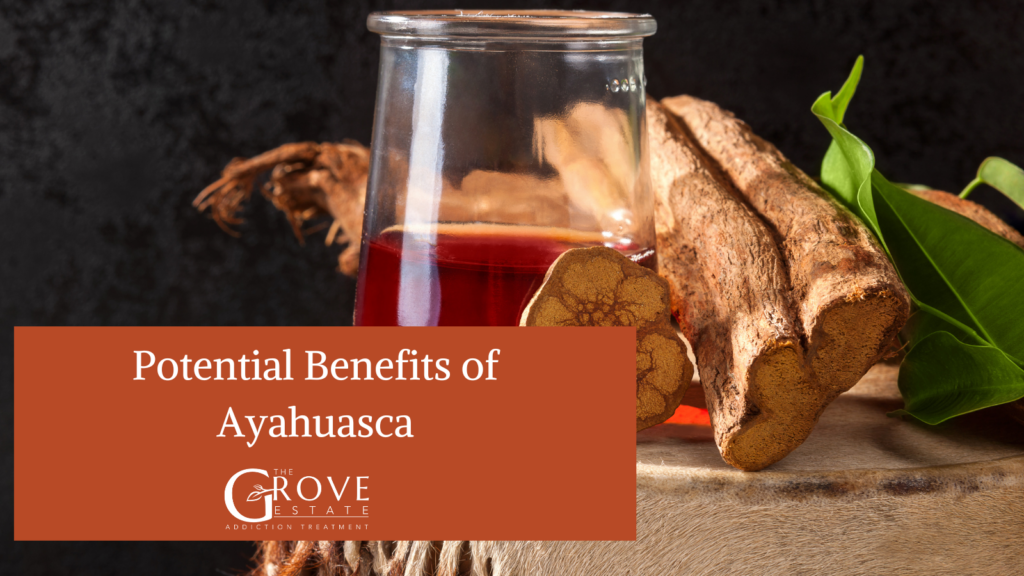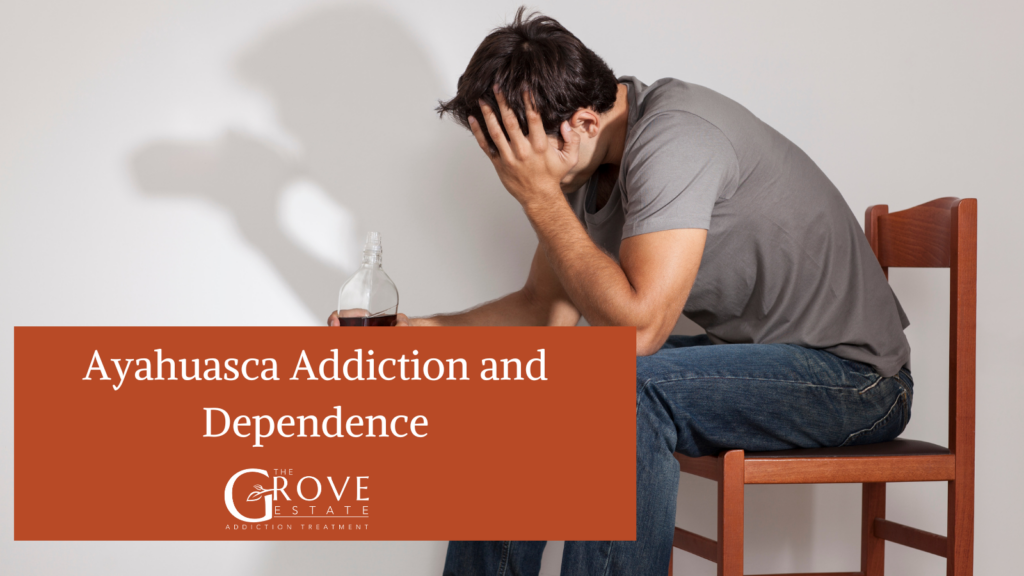Ayahuasca, also known as Huasca, Daime, Yage, and La Purga, is becoming increasingly popular by the day. Right now, its knowledge and use is largely limited to its native countries. Some leaves and vines native to the Amazon are brewed together to produce a hallucinogenic tea called ayahuasca.
Its two main components – ayahuasca vine and leaves from the chacruna shrub – are legal in the United States but ayahuasca is sometimes categorized as an illicit drug. This is due to the presence of dimethyltryptamine (DMT) in the leaves. This component is categorized, by the United States Drug Enforcement Agency (DEA), as a Schedule I drug – very addictive and has no medical use.
Ayahuasca is used by some in treating addiction issues like opioid addiction and alcoholism. But it also has a risk of addiction and could pose serious side effects, including instant death. About 1.2 million people aged 12 years and above reported some form of hallucinogens use in 2014, according to the Substance Abuse and Mental Health Services Administration.

Potential Benefits of Ayahuasca
Users have spoken highly of the positive long-term benefits of ayahuasca. Such benefits are likely due to how ayahuasca impacts the neurological system. Some of the benefits of ayahuasca are:
- It may benefit brain health: some studies have shown its active ingredients to have a level of neuro-restorative and neuroprotective qualities.
- It may improve psychological well-being: the mindfulness ability of the brain can be enhanced by ayahuasca, leading to improved psychological well-being.
- It may be useful in the treatment of addiction, anxiety, and others: ayahuasca has been used both in research and application as a part of addiction treatment. A marked difference in effectiveness was recorded when ayahuasca was used to treat addiction, anxiety, etc.
Is Ayahuasca Addictive?
Despite the benefits of ayahuasca stated above and its low propensity for dependence, it can cause addiction and lead to diverse other problems. In fact, the allure of the expected gains makes ayahuasca dependence often go under the radar until bigger problems emerge.
The addictive possibility of ayahuasca is often refuted by many but there are no facts to back such claims about a hallucinogenic tea. Virtually anything an individual does that gives some form of ‘enjoyment’ can cause addiction. The difference is in how addictive they are. While the addictive potential of ayahuasca is relatively low, it is a possibility.
To explain how ayahuasca addiction can happen, its effect on the brain has to be understood.
Ayahuasca and The Brain
Just like other hallucinogens, ayahuasca contains dimethyltryptamine (DMT). Hence, it influences the brain similarly. Separately, DMT has little to no real effects but in combination with other substances, its real effects are activated.
The structure of DMT is similar to that of serotonin, a chemical messenger (neurotransmitter) in the brain. Serotonin regulates mood. So, the combination of DMT and ayahuasca triggers psychedelic effects. Users experience strong hallucinations and euphoria.
Studies and research are still ongoing to see how extensive the effects of ayahuasca are on the brain. With time, more will be known about how ayahuasca works in the brain.

Ayahuasca Addiction and Dependence
There is a low risk of developing ayahuasca dependence or addiction. However, there is always the possibility of getting addicted to the experience of using it. The effects hallucinogens have on the brain makes this particularly true. Ayahuasca addiction is more about the experiences associated with the use of the drug than the drug itself.
How Do I Know I Am Addicted to Ayahuasca?
While the chance of ayahuasca addiction is low, according to studies and research, users can develop the addiction. If you want to evaluate if you or a loved one has developed a continual psychological need and craving for ayahuasca, check for the following signs:
- Inability to stop usage: if you are unable to stop using ayahuasca despite attempts to stop, you have most likely developed an addiction
- Keeping its use a secret: if you ever have to keep using ayahuasca away from others for the fear of being confronted, addiction is on the card.
- Neglecting responsibilities: if you or your loved one focuses primarily on using ayahuasca while key responsibilities at work, home, or school are being neglected, ayahuasca Addiction may have developed
Abusing other addictive substances to reduce the adverse effects of ayahuasca is also a sign of addiction.
If one or a combination of some or all of the above signs are observed, it calls for serious attention. Otherwise, severe health problems, including death, may be on the horizon.
What are the Effects of Ayahuasca?
Ayahuasca is a very intense hallucinogenic tea. It is difficult to measure the intensity for the purpose of usage control because the potency in the batches vary. Ayahuasca is able to make individuals see, feel, and hear things that are not real. Some of its effects are fatal, though the most common symptoms are mild. For example, its vomiting and diarrhea effects are so common that many now see it as a part of the experience (calling it body purification) despite the high risk attached if excessive. People taking antidepressants may face lethal consequences as a result of how ayahuasca interacts with serotonin. The effects of ayahuasca on users include:
Short-term physical effects are:
- Vomiting
- Diarrhea
- Nausea
- Anxiety
- Hallucinations
- Paranoia
- Increased blood pressure
- Increased heart rate
- The long term effects include
- Change in brain structure
- Psychosis
- Hallucinogen persisting perception disorder (HPPD)
- Change in personality
Note: studies and research are ongoing on the long-term effects of ayahuasca, hence more effects are likely to be included.
Treatment of Ayahuasca Addiction
If you or a loved one have ayahuasca addiction, you can make a full recovery from the damage done and make a fresh start. Effective treatment options make it easier for affected people to get through withdrawal symptoms safely, build relapse prevention skills, get support, and establish healthy life skills.
Inpatient treatment: Inpatient treatment is the most intense addiction program. Individuals live in a rehab facility, undergo various therapies, and enjoy round the clock support. It is an appropriate option for:
- People with serious ayahuasca Addiction
- People abusing other substances along with ayahuasca
- As well as people with co-occurring disorder (a substance addiction with a mental health disorder)
Inpatient treatment ranges from 30 to 90 days.
Outpatient treatment: Individuals undergoing outpatient treatment live at home and could still be doing other things like going to work while undergoing addiction treatment. They are typically required to visit a rehab facility a few days a week. Outpatient treatment is among the most common treatment options for ayahuasca addiction.
Note: treatment plans for ayahuasca addiction are designed according to the needs of each individual. It is also typically a combination of different components, such as individual therapy, group therapy, and support groups, to improve effectiveness.
Can Individuals Treat Ayahuasca Addiction Themselves?
The treatment of all types of addiction is very difficult to do personally because it can be very overwhelming. More often than not, people who attempt to treat addiction themselves go back to using the substance. Therefore, the best option is to reach out to a professional for an appropriate and specific treatment plan. The support provided is a very important part of the process of recovery.
Is Ayahuasca Dangerous?
Ayahuasca is a powerful tea with diverse side effects when abused or misused. It can cause a wide range of complications that reduce the quality of life of individuals. Therefore, it must be taken with caution and any sign of addiction must be taken seriously and get help immediately.
Can I Drink Ayahuasca if I am Taking Antidepressants?
Ayahuasca is a plant-based psychedelic, hence taking it with antidepressants can be very dangerous. When the psychedelic effects triggered by the combination of DMT and ayahuasca interact with antidepressants, serotonin syndrome can develop. This lethal adverse drug reaction is a result of the ability of both ayahuasca and antidepressants to raise serotonin neurotransmission. The severity of this syndrome ranges from mild to fatal.
Is Ayahuasca Overdose Possible?
DMT is a key part of ayahuasca and DMT overdose is becoming increasingly popular. Some of the symptoms of DMT overdose are: agitation, rapid heart rate, high blood pressure, confusion, muscle coordination problems, headache, severe vomiting, respiratory distress, seizures, and Coma. If you or anyone around you is manifesting these symptoms, get help immediately.
How does ayahuasca use differ from opiate addiction?
Ayahuasca use primarily involves seeking spiritual or psychological healing, often under controlled, ceremonial conditions, and is not typically characterized by the compulsive, harmful patterns seen in opiate addiction. Unlike opiates, ayahuasca doesn’t generally lead to physical dependence, though psychological dependence can occur. According to studies, the ritualistic use of ayahuasca aims at profound personal insight or spiritual breakthroughs, rather than escaping reality or alleviating physical pain, which is more common in opiate use.
While opiate addiction requires a structured treatment approach, including possible medication-assisted therapy, ayahuasca addiction treatment might focus more on understanding and integrating the psychological aspects of dependence. In cases where ayahuasca use becomes problematic, residential rehab can offer a supportive environment for individuals to address the underlying reasons for their use and develop healthier coping mechanisms.

Share This Post



